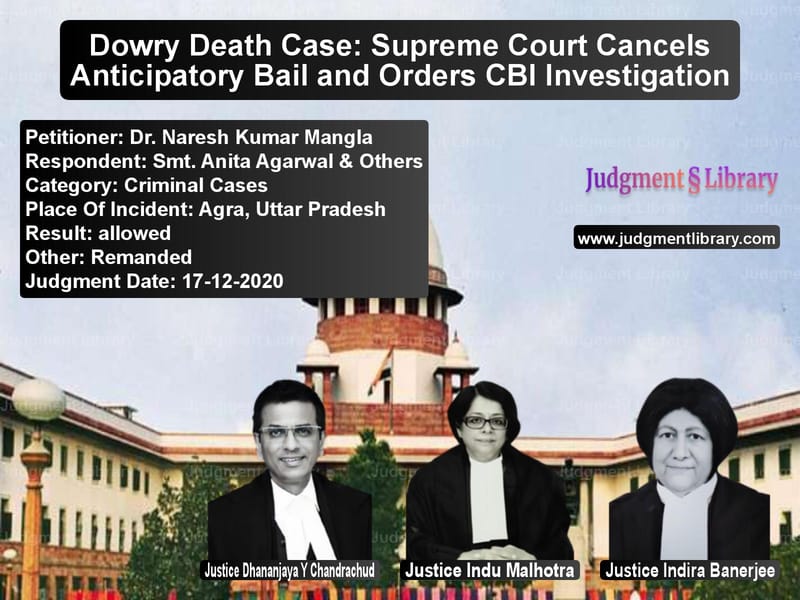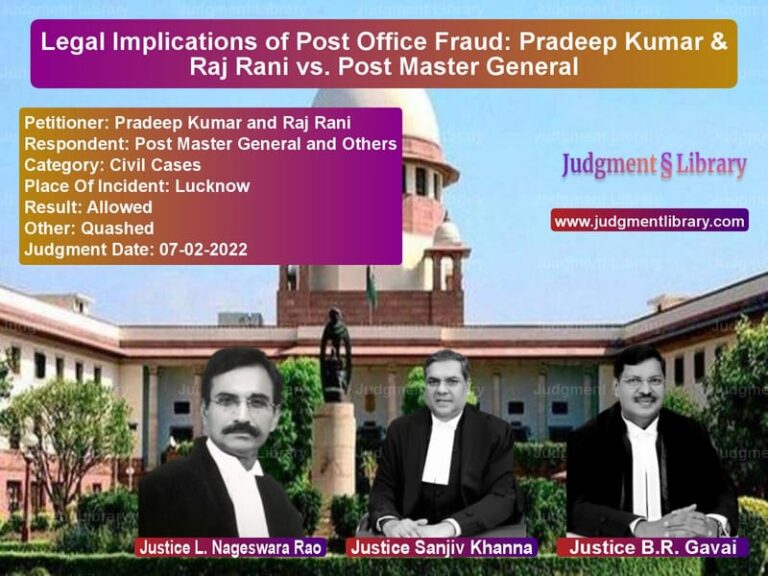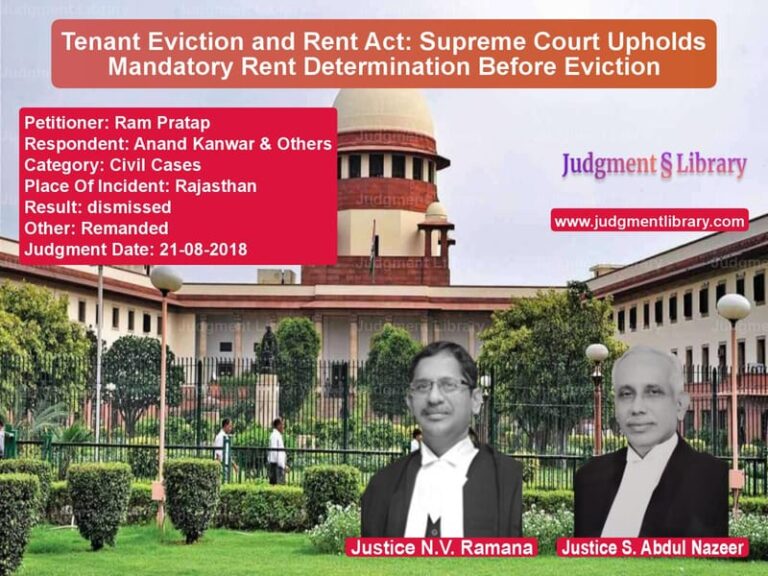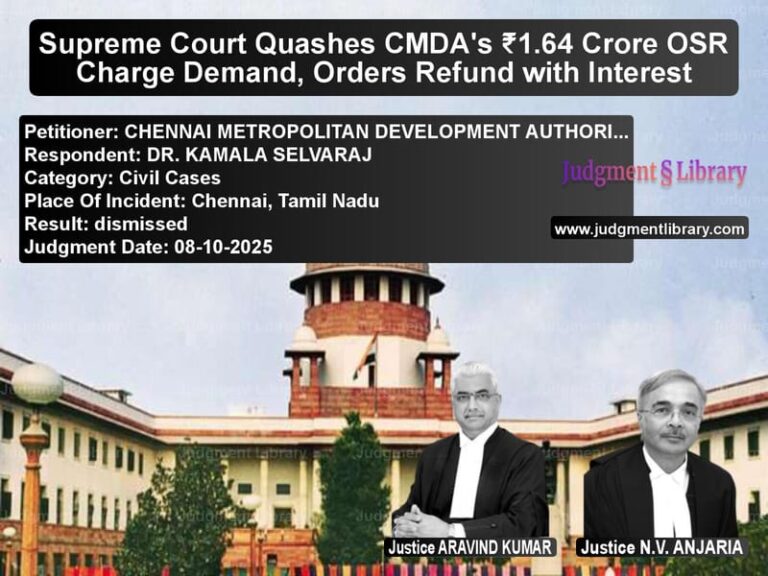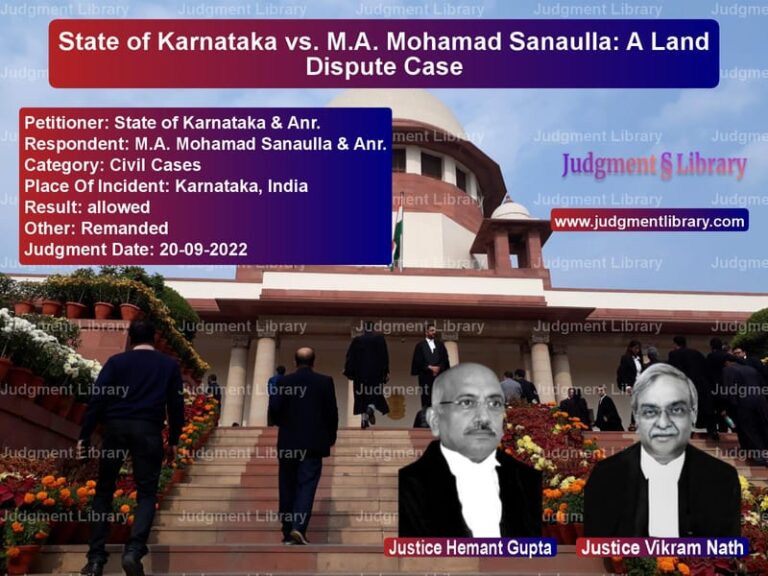Dowry Death Case: Supreme Court Cancels Anticipatory Bail and Orders CBI Investigation
The case in question involves the tragic death of Dr. Deepti, who allegedly died by suicide due to persistent dowry harassment by her in-laws. Her father, Dr. Naresh Kumar Mangla, filed an FIR against the in-laws, leading to criminal proceedings under Sections 498A, 304-B, 323, 506, and 313 of the Indian Penal Code (IPC) and Sections 3 and 4 of the Dowry Prohibition Act, 1961. The Supreme Court reviewed the matter after the High Court granted anticipatory bail to the accused.
Background of the Case
Dr. Deepti was married to Sumit Agarwal on November 3, 2014. According to the complainant, her father, he spent over Rs. 1.5 crores on the wedding. Despite this, Deepti was allegedly harassed by her husband and in-laws for additional dowry. The father claims that he had transferred money multiple times to her in-laws. On August 7, 2020, the father lodged an FIR alleging that Deepti had been beaten and threatened 18-19 days before her death, leading to her taking her own life on August 6, 2020.
Legal Proceedings and High Court Decision
Following the lodging of the FIR, the husband, Sumit Agarwal, was taken into custody. However, the other accused—Deepti’s in-laws—filed for anticipatory bail. The Sessions Court in Agra denied bail on August 21, 2020, citing evidence of financial transactions from Deepti’s account to her father-in-law’s account and past records of abuse. Subsequently, the accused approached the High Court, which granted them anticipatory bail on September 29, 2020, ruling that the allegations were general in nature and no specific role was assigned to them.
Supreme Court’s Review
The Supreme Court found multiple deficiencies in the High Court’s reasoning and the police investigation. Key points raised by the Court included:
- The FIR contained specific allegations of dowry demands, previous instances of abuse, and financial transactions.
- Despite the alleged suicide, no proper investigation was conducted to determine whether the death was homicidal.
- The accused had received significant amounts of money from the deceased and her family, which required further investigation.
- The High Court erroneously concluded that there was no correlation between the allegations in the FIR.
Supreme Court’s Key Observations
The Supreme Court held:
“The FIR contains a reference to the previous incident of October 2017, to the demands for dowry, payments of money in cheque by the informant to the groom’s family, and the telephone calls received by the informant from the father-in-law of the deceased and later from the deceased in close proximity to the incident, on the same day that she died.”
It further stated:
“The entire approach of the High Court is flawed. It is contrary to the record and, as we shall now explain, contrary to settled principles of law governing the exercise of discretion on the grant of anticipatory bail in a case involving the alleged commission of a serious offence.”
Cancellation of Anticipatory Bail
The Supreme Court ruled that anticipatory bail should not have been granted to the accused given the gravity of the allegations. It cited several precedents, including:
- Puran vs. Ramvilas (2001): Bail can be canceled if it ignores material on record.
- State of U.P. vs. Amarmani Tripathi (2005): Courts must carefully evaluate allegations before granting bail.
- Jaiprakash Singh vs. State of Bihar (2012): Anticipatory bail should be granted only in exceptional cases.
- Sushila Agarwal vs. NCT of Delhi (2020): Factors such as the role of the accused and potential interference in the investigation must be considered.
Transfer of Investigation to CBI
The Supreme Court found significant lapses in the police investigation. Despite allegations of murder, no inquiry was conducted into whether the death was homicidal. The Court noted that selective leaks of information to the media had compromised the fairness of the investigation.
The Court ruled:
“The apprehension of the appellant that the accused have a prominent social status in Agra and may have used their position in society to thwart a proper investigation cannot be regarded to be unjustified.”
It further observed:
“The conduct of the investigating authorities from the stage of arriving at the scene of occurrence to the filing of the charge-sheet does not inspire confidence in the robustness of the process.”
Final Judgment
The Supreme Court issued two key directions:
- The anticipatory bail granted by the High Court was canceled.
- The Central Bureau of Investigation (CBI) was directed to take over the case.
Conclusion
This case highlights the serious issue of dowry harassment and the legal complexities surrounding anticipatory bail in such matters. The Supreme Court’s decision emphasizes the need for thorough investigations in cases of unnatural deaths within marriage and ensures that legal protections are not misused by influential accused parties. The ruling sets a precedent for stricter scrutiny of anticipatory bail applications in serious criminal cases.
Petitioner Name: Dr. Naresh Kumar Mangla.Respondent Name: Smt. Anita Agarwal & Others.Judgment By: Justice Dhananjaya Y Chandrachud, Justice Indu Malhotra, Justice Indira Banerjee.Place Of Incident: Agra, Uttar Pradesh.Judgment Date: 17-12-2020.
Don’t miss out on the full details! Download the complete judgment in PDF format below and gain valuable insights instantly!
Download Judgment: Dr. Naresh Kumar Man vs Smt. Anita Agarwal & Supreme Court of India Judgment Dated 17-12-2020.pdf
Direct Downlaod Judgment: Direct downlaod this Judgment
See all petitions in Dowry Cases
See all petitions in Attempt to Murder Cases
See all petitions in Suicide Cases
See all petitions in Judgment by Dhananjaya Y Chandrachud
See all petitions in Judgment by Indu Malhotra
See all petitions in Judgment by Indira Banerjee
See all petitions in allowed
See all petitions in Remanded
See all petitions in supreme court of India judgments December 2020
See all petitions in 2020 judgments
See all posts in Criminal Cases Category
See all allowed petitions in Criminal Cases Category
See all Dismissed petitions in Criminal Cases Category
See all partially allowed petitions in Criminal Cases Category

